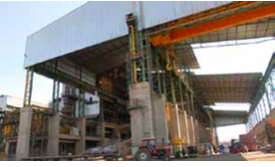IDC takes development funding to new heights, boosting rural employment
IDC takes development funding to new heights, boosting rural employment sadminMandla Mpangase - Public Relations Manager at IDC

Photo caption: The IDC will provide more money for development
The Industrial Development Corporation (IDC) is generating more money for funding development, especially in rural areas.
In the financial year ending on 31 March 2012, the IDC grew its funding activity by 55% to R13.5 billion, while the number of funding approvals rose by 33% to 293.
It is the corporation’s highest ever level of investment in the local economy, making a considerable contribution to job creation, says IDC Chief Executive, Geoffrey Qhena.
The rise in the number of approvals in the year under review will help to create or sustain about 45 900 local jobs, compared to 39 400 in the previous financial year. Of particular significance, Qhena says, is that 48% of these jobs were based in rural areas and were largely created by IDC’s investment in mining, agriculture and renewable energy sectors. As a result, 99% of funding approvals went towards projects aligned to objectives of the New Growth Path (NGP) and the Industrial Policy Action Plan (IPAP) policies.
“Our objective is to grow the local economy through the development of industrial capacity, with job creation as a critical outcome and, where possible, benefitting communities in far-flung areas, in line with the objectives set out in the NGP and IPAP,” says Qhena. As part of a broader strategy to grow South Africa’s industrial base, the IDC is focusing on expanding the fabricated metals, capital and transport equipment industries on the back of the planned capital expenditure programmes of state-owned companies (SOCs), Transnet, Prasa and Eskom among other public sector entities.
This massive capital injection and infrastructure development programme, together with the operational requirements over a longer term, present an exceptional opportunity for the IDC to participate in projects that seek to promote downstream beneficiation and localisation. To this end, the development funder is already a key participant in various strategic infrastructure initiatives spearheaded by the Presidential Infrastructure Coordinating Commission and rolled out through the associated Strategic Integrated Projects. Other areas of future focus for the IDC include investing in the development of a local antiretroviral pharmaceuticals industry; the expansion of the motor vehicles and components industry; and value addition in the agricultural and mineral value chains.
In addition, the IDC continues to play a critical role in South Africa’s transition to a green economy having approved R5, 2 billion in funding for ventures that received bid awards in the first round of the Renewable Energy Procurement Program (REPP).
“To ensure that rural based or marginalised communities benefit from this transition to a green economy, 12 of the renewable energy projects funded by the IDC will have Broad Based Black Economic Empowerment participation, whose objective is to benefit rural communities,” says Qhena.
Qhena is upbeat about the IDC’s role to grow the economy into the future. “The road ahead may be fraught with challenges, but our human capital wealth, solid financial position and our steely resolve to contribute to local and the continent’s social and economic development places us in a strong position to make a difference.”